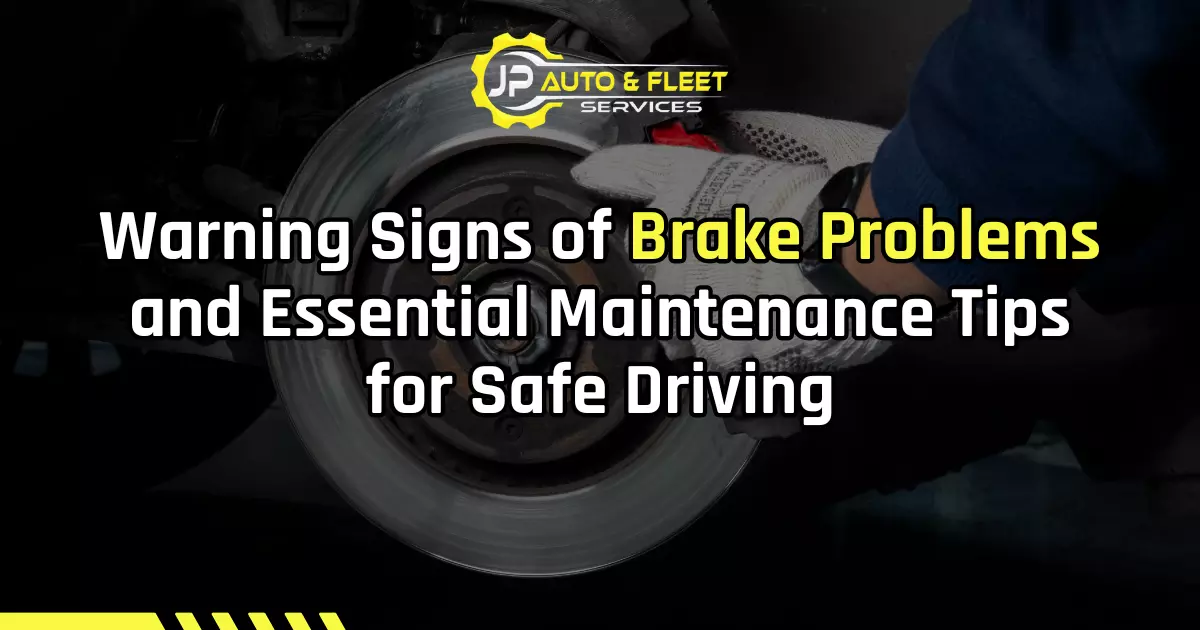Brakes are critical for safe driving, but they often get ignored until something goes wrong. Warning signs like a soft brake pedal or a brake warning light should not be overlooked. Issues such as worn brake pads, fluid leaks, or a stuck caliper can lead to dangerous consequences. Regular brake inspections and maintenance help keep brakes working well and avoid costly repairs. Take care of your brake system to prevent brake failure and stay safe on the road.
Keep reading to learn how to spot problems early on your brakes.
Why Is Regular Brake Maintenance Crucial for Safe Driving?
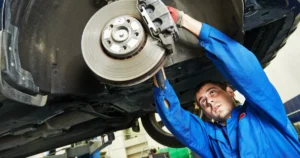
A reliable brake system is important for safe driving. If you skip regular brake maintenance, you could have brake problems or even a brake failure accident. These problems are dangerous and can lead to costly repairs. Watching for warning signs like worn brake pads or a soft brake pedal can help stop bigger issues. Getting brake inspections often keeps your brakes working well and last longer.
Here are some benefits of doing brake maintenance.
Optimal Brake Performance
Regular maintenance helps your brakes work well. Fixing uneven braking or abnormal sounds makes sure your brakes stay safe. Replacing worn brake pads, checking brake rotors, and bleeding brake fluid are simple but important steps. These tasks help your brakes perform even in bad weather conditions.
Prevents Costly Repairs
Ignoring warning signs like the ABS warning light or brake system warning light can cause expensive repairs. Problems like worn brake pads or a soft brake pedal get worse if not fixed. Regular brake checks and replacing parts on time stop these issues. Fixing small problems early keeps your brakes working well.
Extended the Lifespan of Brake Components
Annual brake inspections find problems like uneven pressure or low fluid levels that can damage your brakes. Replacing worn brake pads and fixing signs of brake problems makes your brakes last longer. Regular brake maintenance is the key to extending the brake life of your car.
Enhanced Overall Vehicle Safety
Well-maintained brakes reduce the risk of brake failure and help during emergencies. They improve control during emergency braking or going down a steep hill. Fixing pressure imbalances stops brake pull and makes sure the car stops smoothly. Keeping brake components in good shape avoids safety hazards.
What Are the Most Common Warning Signs of Brake Problems?
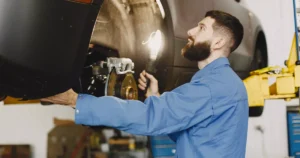
Brakes are key to safe driving, but many drivers miss the warning signs of trouble. A soft brake pedal or uneven braking often points to deeper brake issues. Ignoring these telltale signs can lead to expensive repairs or even a brake failure accident. Watching for common signs like worn brake pads or a brake warning light helps avoid problems.
Understanding these signs below keeps your brakes well-maintained.
Squeaking, Grinding, or Metallic Noises
Strange sounds like squeaking or a metallic grinding sound are warning signs of worn brake pads or a brake caliper issue. These noises happen when the brake pad wear indicator touches the rotor. This means it’s time for a brake inspection. Ignoring these sounds can cause brake damage and lead to expensive repairs.
Soft or Spongy Brake Pedal
A soft brake pedal is often caused by air in the brake lines, brake fluid leaking, or a bad master cylinder. This problem weakens braking functions and makes stopping harder. It can increase the chance of a brake failure accident. Regular brake bleeding and checking fluid levels can fix this issue.
Illuminated Brake Warning Lights
A brake warning light or ABS warning light on your dashboard is a clear warning sign of a brake issue. These lights may mean there is a fluid leak, worn brakes, or a problem with the Anti-lock Braking System. Ignoring these warning lights can lead to a complete brake failure.
Uneven Braking or Pulling to One Side
If your car pulls to one side when braking, it may mean uneven brake pad wear, a stuck caliper, or a faulty brake hose. This creates uneven pressure in your brake system, which can make stopping unsafe. Uneven braking is a common brake issue that needs attention and ignoring it can cause dangerous consequences on the road.
Excessive Vibration or Pulsation When Braking
If your brakes vibrate or pulse too much, it might mean warped rotors or excessive heat in your brake system. This reduces your brake safety and wears out your brake components faster. Fixing warped brake rotors or upgrading to carbon-ceramic rotors can solve this issue.
How Can You Identify Issues with Specific Brake System Components?
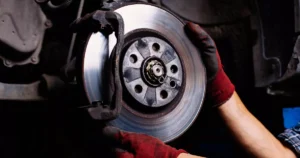
The brake system has many critical components that work together to ensure safe driving. Knowing the warning signs of a problem can help avoid brake failure and other dangers. Common signs like a brake warning light or abnormal sounds mean there could be a brake issue. Ignoring these signs can lead to expensive repairs and reduce your vehicle’s brake life.
Below are some of the issues in the brake system components.
Signs of Worn Brake Pads or Rotors
Worn brake pads often cause a grinding sound or a metallic noise when you use the brakes. Over time, this can damage the brake rotor, leading to warped rotors and excessive heat. Checking for uneven brake pad wear or the brake pad wear indicator can catch problems early. Replacing brake pads on time keeps your braking functions working well and prevents damage to the disc brake or brake caliper.
Symptoms of a Faulty Master Cylinder
The master cylinder is a critical part of the brake system. Problems with it can cause a soft brake pedal or a loss of brake pressure. If the brake pedal feels spongy, it may mean a fluid leak or damage to the master cylinder. A trustable mechanic can inspect and fix it to restore proper pressure in the brake lines.
Indicators of Brake Fluid Leaks
A fluid leak is a serious brake issue that makes the braking system less effective. You might notice a puddle of fluid under your car or low fluid levels in the reservoir. Leaking brake fluid can also trigger a brake warning light on the dashboard. Regular inspections of fluid lines and brake hoses help prevent brake failure.
Common Problems with Anti-lock Braking System
Anti-lock braking system (ABS) light on your dashboard often signals an issue with the Anti-lock Braking System. This could mean faulty sensors, a bad brake caliper, or broken electronics. A working antilock brake system is important to stop wheels from locking during sudden stops or slippery roads. Expert technicians can fix these problems to ensure safe automatic braking.
What Are Expert Tips for Maintaining a Reliable Brake System?
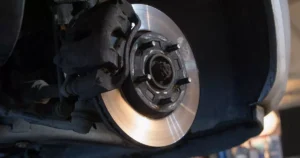
A well-maintained brake system is essential for safe driving and avoiding brake problems and accidents. Proper care extends the brake life and ensures consistent performance. Schedule regular brake maintenance and watch for warning signs to avoid expensive repairs. Proactive habits keep your brakes in top shape. A reliable system reduces risks and gives you peace of mind.
Here are some tips for painting your brake system.
Regularly Check Brake Fluid Levels and Quality
Checking brake fluid is important for keeping your braking functions working well. Contaminated or low fluid levels can cause a loss of brake pressure and lead to brake failure. Regular checks prevent fluid leaks and keep the master cylinder and brake lines in good shape. Replace the fluid as recommended by the vehicle manufacturer. This keeps your brakes performing their best.
Monitor Brake Pad Wear and Replace as Needed
Worn brake pads often make a grinding sound or a metallic noise. Regularly check the brake pad wear indicator to know when to replace them. Fixing excessive brake pad wear reduces stress on parts like the brake rotor and brake caliper. Replacing pads on time avoids expensive repairs and keeps your brakes safe. Monitoring wear is key to a healthy brake system.
Address Warning Signs Promptly with Professional Help
Ignoring warning lights, like the brake warning light or ABS light, can lead to failures in brake system components. Problems like uneven brake pad wear, abnormal sounds, or a soft brake pedal need quick attention from a professional mechanic. Timely brake service appointments stop minor issues from turning into major repairs. Acting on warning signs protects your brakes and prevents accidents.
Avoid Aggressive Driving Habits That Cause Excessive Wear
Aggressive habits, like sudden stops or riding the brakes downhill, wear out brake shoes and brake discs faster. Gradual braking reduces excessive heat and extends the life of your brakes. Use the parking brake for support on inclines. Safe driving habits keep your brake components working longer. Avoiding excessive wear saves money and keeps your car safe.
When Should You Seek Help from a Professional Mechanic?
Some brake issues need expert care, like fluid leaks, a stuck caliper, or a bad master cylinder. A professional mechanic has the tools and skills to fix these problems. Early help prevents brake failure accidents and keeps your brake system components in good condition. Complex issues like warped rotors or faulty brake hoses are easier to solve with professional help.
Below are the reasons that you might need professional help.
Identifying Complex Brake Issues
Problems like uneven brake pad wear, a faulty brake hose, or warped rotors need detailed inspections. A professional mechanic can find and fix issues that routine checks might miss. Fixing these problems early avoids damage to parts like the disc brake or rear drum brakes.
Handling Brake System Overhauls or Replacements
Big repairs, like replacing the master cylinder or fixing corroded brake lines, need technical skills. A professional ensures the job is done right. Fixing a collapsed brake hose or an entire brake system overhaul requires care and precision. Professionals make sure your braking functions stay reliable and effective.
Ensuring Proper Diagnostics and Safe Repairs
Warning lights, like the brake warning light, often mean hidden problems in the braking system components. Professionals use diagnostic tests to find the cause, whether it’s a faulty sensor, a fluid leak, or excessive brake wear. Proper automotive service and repair reduces the risk of brake failure during emergencies, like driving down a steep hill.
Wrapping Up
Recognizing the signs of brake problems is essential for maintaining your vehicle’s safety and performance. From worn brake pads to a soft brake pedal, these telltale signs signal when your brakes need attention. Ignoring them can lead to expensive repairs, reduced braking functions, and potential safety hazards. By staying proactive with regular maintenance and addressing issues promptly, you can extend the brake life, enhance vehicle reliability, and prevent dangerous consequences.
If you’re noticing warning signs, JP Auto & Fleet Services’ brake services are your trusted solutions. Our team of expert technicians uses cutting-edge diagnostics to address any brake issue—from routine brake inspections to complex system repairs. We ensure your vehicle gets back on the road with well-maintained brakes and consistent braking performance.
Contact us now at 214-836-9333 to schedule your brake service and experience the confidence of driving with a reliable braking system.

